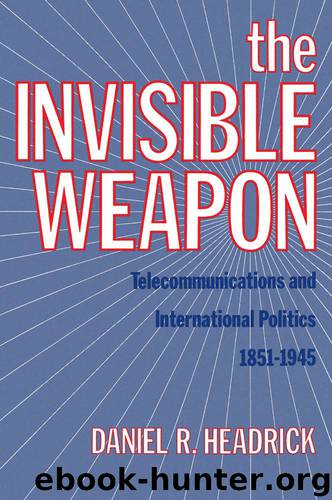The Invisible Weapon: Telecommunications and International Politics, 1851-1945 by Headrick Daniel R

Author:Headrick, Daniel R. [Headrick, Daniel R.]
Language: eng
Format: epub
Publisher: Oxford University Press
Published: 1991-03-28T00:00:00+00:00
Propaganda
World War I was the first war in which propaganda played a major role. All belligerents used it to keep up the fighting spirit of their own people, to sap that of their enemies, and to enlist the sympathy and aid of neutrals. Here the Allies had a great advantage, since they controlled the world’s cables.
Before the war, four news agencies had divided up the world: Asia and the British Empire were reserved for Reuters, southern Europe and Latin America for Agence Havas, northern Europe for Wolff, and North America for the Associated Press. Reuters’ vaunted independence from the British government vanished when the war broke out. It received government subsidies to distribute official Allied war communiqués to neutral countries, and its managing director, Sir Roderick Jones, also served as director of propaganda in the Ministry of Information.48
The Havas news agency, always an organ of the French government, continued to transmit Allied communiqués to Latin America. In the early years of the war, when the United States was still neutral, Havas refused to let the Associated Press, its cartel-mate, sell German communiqués to Argentina. In spite of this, the AP resisted official pressure to take over Havas’ territory in order to avoid becoming a vehicle for U.S. government propaganda.49
The most important, and controversial, use of propaganda was to sway public opinion in neutral countries, especially the United States. Here the Allies, Britain in particular, used both a steady flow of news items and an effective censorship of the news from the opposite side. According to one journalist, three-quarters of the dispatches from American correspondents in Central Europe were eliminated by the British censors.50 An authoritative study of the news reaching America from the war concluded:
During the first year of the war, never more than 4 per cent of the front-page news [in the New York Times] came directly from Germany, while 70 per cent came from Entente origins, chiefly London. The direct German proportion never exceeded 12 per cent. …
The tendency of the news was always in favor of the belligerent furnishing the greater amount. Most of the tendentious news was directed against a belligerent, rather than in favor of a belligerent. For several months after August, 1914, the news was not much more favorable to the Entente than to the Central Powers, but following the sinking of the Lusitania antipathy toward Germany rapidly mounted. …
Under modern conditions, neutrality tends to terminate in favor of the belligerent which supplies the largest amount of news … the advantage of the belligerent in command of the means of communication is tremendous.51
There was more to propaganda than the sheer quantity of words transmitted; there was also a certain subtlety the British possessed, and the Germans lacked, as Franz Rintelen admitted. In 1915, he wrote,
everybody in Germany was raging. Large packets of newspapers had been received from America, and there was not a word of truth in the reports that were being made about the military situation. We were particularly indignant at the numerous stories of atrocities which had found their way into the American papers.
Download
This site does not store any files on its server. We only index and link to content provided by other sites. Please contact the content providers to delete copyright contents if any and email us, we'll remove relevant links or contents immediately.
The Secret History by Donna Tartt(19083)
The Social Justice Warrior Handbook by Lisa De Pasquale(12190)
Thirteen Reasons Why by Jay Asher(8907)
This Is How You Lose Her by Junot Diaz(6885)
Weapons of Math Destruction by Cathy O'Neil(6279)
Zero to One by Peter Thiel(5799)
Beartown by Fredrik Backman(5751)
The Myth of the Strong Leader by Archie Brown(5507)
The Fire Next Time by James Baldwin(5441)
How Democracies Die by Steven Levitsky & Daniel Ziblatt(5218)
Promise Me, Dad by Joe Biden(5153)
Stone's Rules by Roger Stone(5087)
A Higher Loyalty: Truth, Lies, and Leadership by James Comey(4959)
100 Deadly Skills by Clint Emerson(4924)
Rise and Kill First by Ronen Bergman(4788)
Secrecy World by Jake Bernstein(4751)
The David Icke Guide to the Global Conspiracy (and how to end it) by David Icke(4717)
The Farm by Tom Rob Smith(4506)
The Doomsday Machine by Daniel Ellsberg(4490)
